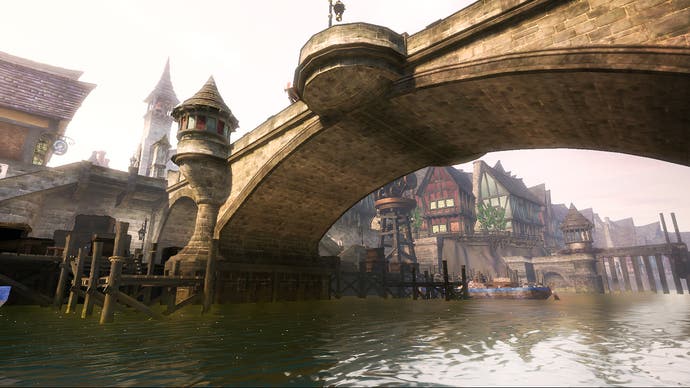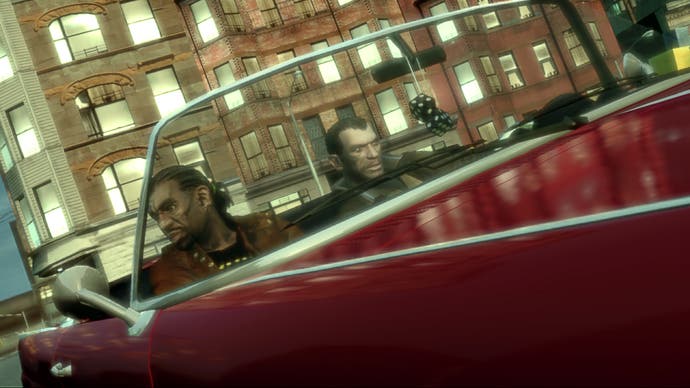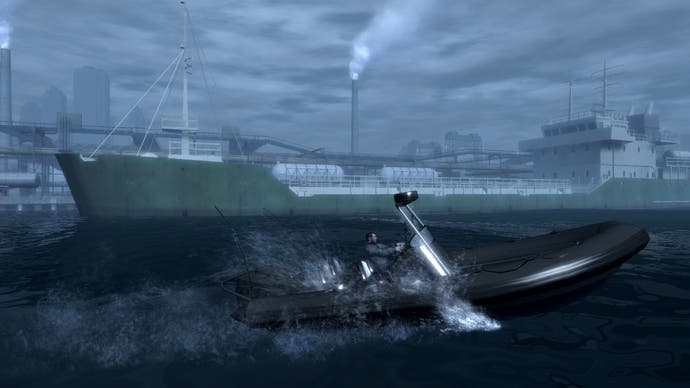Eurogamer's Top 50 Games of 2008: 10-1
We've already fled the country. All of them.
4. Fable II
Microsoft / Lionhead / Xbox 360
Johnny Minkley: I was saving this as my big 'Christmas game', since I've only managed to squeeze in a few hours so far. And then I went to Lionhead to interview Molyneux with Christian Donlan and was swept away in the spoiler avalanche that was their Fable love-in. I'm just going to have to drink myself amnesiac.
John Walker: I hate dogs. Can they make a version where you have a pet cat?
Kristan Reed: A little too accessible for its own good, but the addition of co-op play clinches it for me. Well done Lionhead for actually managing to deliver on the hype.
Christian Donlan: Lionhead chose to preview this in very discrete chunks which didn't seem to be that obviously connected, so I went into Fable II thinking that the bits and pieces I'd seen might not come together particularly gracefully. Crikey. People say it's short and get annoyed when it breaks all the rules, but in terms of not just creating brilliant content, but ensuring that a majority of players will actually get to see most of it, this leaves other games looking a little stupid.
Keza MacDonald: COR BLIMEY, LIL' SPARRA, A TEN? LAWKS!

Kieron Gillen: World of Goo is just amazing.
Tom Bramwell: "They're using a giant worm!"
Dan Whitehead: Fable II thoroughly deserves top marks. At least, it does in principle. So many of the ideas at play here are so brilliant and obvious that you wonder why games haven't latched onto them earlier. The fact that experience is a more valuable commodity than health in a genre driven by quicksaves and healing potions, for example. Yet the game never quite gets the balance right, making it far too easy to build up massive reserves of gold and XP. For every step forward, Fable II takes two sideways. It's also glitchy and buggy and only starts to get interesting once you reach the end of the main story. I'm happy to call it one of my favourites of the year, but my affection is ultimately based on empathy for what it attempts rather than inspiration from what it actually does.
Simon Parkin: The technical issues with the game are infuriating, not because they spoil the experience but because they dominated conversation about it, conversation that would be better spent discussing its triumphs rather than its shortfalls. The choices may be limited, the interactions simplistic, but buy into this world and its systems and you'll leave a richer person, and not only in terms of virtual real estate.
Tom Bramwell: Sometimes I'm in the mood for games that want to smack my head in. Sometimes I want games that let me smack their heads in. Sometimes I want to smack my friends. I don't have to be in any sort of mood to play Fable II, and it actually cures me when I'm in a bad one. Molyneux's debt is repaid.
3. Grand Theft Auto IV
Rockstar Games / Rockstar North / PC, PS3, Xbox 360
Kristan Reed: I love it and hate it in equal measure. Love the ambition, the script, the music, the ambience and the scope, but hate some of the heinous checkpointing and nagging social aspect. One day a GTA game will emerge that doesn't needlessly demand you drive halfway across an enormous map to start a mission, and then I will be a happy camper.
Oli Welsh: I had to do live television because of this game, which was the single most terrifying experience of my life. I wore an orange jumper, repeated myself, and died in the middle of a sentence. Since then, I haven't been able to play it.
Jim Rossignol: Rockstar takes the piss. While the rest of game development struggles to make their voice actors say their lines correctly, and can't quite fulfill their visions of grandeur, Rockstar creates a game with acting on par with HBO's finest, and conjures the illusion of a modern living city that is more convincing that anything else in the galaxy of games. I mean just look at it: they made being an Eastern European immigrant thug in New York seem appealing! Not just appealing, but funny, compelling, even desirable. Magic is at work here. Or amazing, well-funded game design. One of the two.

Simon Parkin: It was the game that everybody started but, reportedly, few finished, if Microsoft's drop-off rate stats are to be taken at face value. This dash to experience Liberty City, to see the world and to be able to pass judgment on it quickly and urgently meant that most voices commenting on the game, from the highest critic down to the lowliest forumite, were often shallow at best. Now, months later, time has mellowed the extremist views, drawing players towards a moderate consensus that this is, in most ways, an extraordinary gameworld, one that houses, in some ways, an extraordinary game.
Rob Fahey: I watched my flatmate play this for weeks without ever having the slightest compunction to pick up the controller myself. I know it's beautiful, accomplished, mature and superbly polished, and I'm very happy that it exists and that it is those things - but it just looks staid and po-faced to me. I nod in appreciation and move on, rather than actually wanting to jump in and play.
Keza MacDonald: I have never enjoyed a Grand Theft Auto game before. Presented with an open world in which I can do anything I want, the last thing on my mind is driving cars and shooting men. Frivolous violence doesn't do anything for me, nor does crude humour. Then, along came Grand Theft Auto IV, and I couldn't do anything but play it for weeks. It's amazingly well made, detailed and broad in scope, yes, and great fun, but it's GTA IV's hidden intelligence that got through to me. It has dark humour and sharp wit that shine through the cheap laughs and over-the-top situations. Niko is believable, and so is his world. For every moment of pointless violence that made me wince, there were six or seven missions in which I felt genuinely involved. The final portion of the game, especially, had me as emotionally involved as any game has. Certainly not what I'd expected from a GTA game. This is something I'd show to anyone who doesn't believe in the potential of videogames. It's a staggering technological achievement.
Kieron Gillen: From a PC perspective, the questionable performance throws a long shadow over this particular triumph from Rockstar. But otherwise... well, it does manage a scale which no other game this year really managed to compete against. It was living proof of what an enormous development budget could allow in terms of creating a place to live and play. Nevertheless, there's a nagging sense - a little like last year's Assassin's Creed - which makes you wonder what a developer more interested in creating that stimulatory environment would have done with it all. They create a city which, ultimately, doesn't really act like a city in any significant way. Something nags, y'know?
Ellie Gibson: It's no Diner Dash.
Dan Whitehead: While I think there's a contrary element to a lot of the criticisms thrown at GTA IV - and the series as a whole - it's hard to deny that there wasn't much that felt new or fresh here. The attempts at crafting a less adolescent story also stumbled slightly, by making it hard to reconcile the sympathetic character of Niko with the bloodshed of the game itself. And yet the whole is still a triumph, of sorts. Even though most of the missions are simply "drive here, shoot them, drive back" the framework still resonates because of the excellent character work and dialogue. One of my most memorable missions simply involved driving a car to a location, but it was made thrilling and important because I was also transporting the corpse of a fairly major character. I'm not sure where they can go for GTA V, but I'm hoping Rockstar leaves crime alone for a while and tells different stories using this amazingly versatile world creator they now have.
Alec Meer: Breaking down GTA to its fundaments and rebuilding them, rather than taking the San Andreas route of simply adding feature-creep to what was already there, was the right choice. I'm not entirely convinced it shook itself up enough to deserve all the breathless accolades, but it's certainly made a case for characterisation, dialogue, detail and animation that the likes of Bethesda should be paying close attention to.

John Walker: I'm still trying to figure out why this is not only the first GTA game I've been able to stomach playing, but also a game I completely adored. Even going back to play the original top-down GTA, I found myself recoiling against the violence and hate at its core. (And please let me stress, I'm in no way condemning this.) Even Vice City's cartoony world made me feel unpleasant when I played it. But GTA IV was compelling. And I think I know what it might be. Sympathy. In no way can I sympathise with anyone from previous GTA games - surely the person I'm playing is the character I should be shooting at, the one I should be trying to stop? But Niko Bellic was different. I couldn't identify or empathise with him, but I could feel sympathy for him. The horrors he had faced had dehumanised him, explaining his sociopathic nature, while also offering the sense that there could be redemption for him, and there was hope in relationships. That's what made the double-cross so much worse, and sends Bellic deeper into his depravity. I don't know whether Rockstar are going soft, or whether this was a happy accident, but they finally made the GTA game for me.
Tom Bramwell: When we did our Editor's panel thing at the Eurogamer Expo, one of our excellent readers followed me out and asked me to justify giving this 10/10, because he'd emptied it so quickly. I knew what he meant. As I said to him though, the reason it's so quickly exhausted is that you stampede through it, bingeing on it, until it's done: the story missions, the radio interludes, the comedy clubs, the Assassin's Creed stuff, the Gone in 60 Seconds stuff, the stunts, the pigeons. It's all gone in about 30 hours or less. You spent 30 hours playing it. I did it twice, as it goes. My game of the year, narrowly from Trials 2, Braid and Gears of War 2. Rockstar spent more money on this than anyone has spent on a game in history, and didn't just make San Andreas 2. Do you honestly not want to see what they do with the proceeds?
